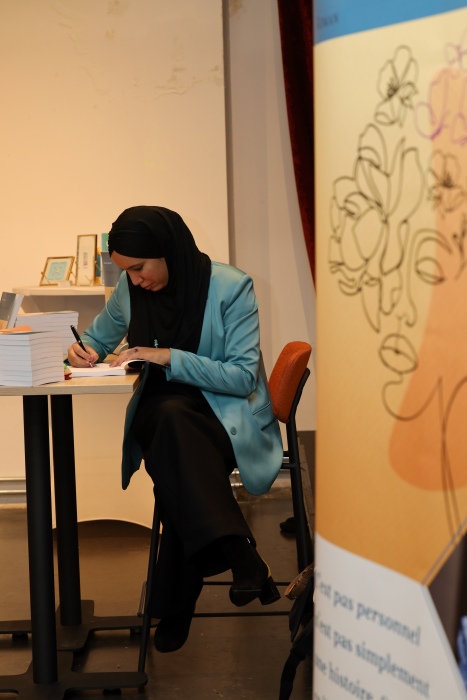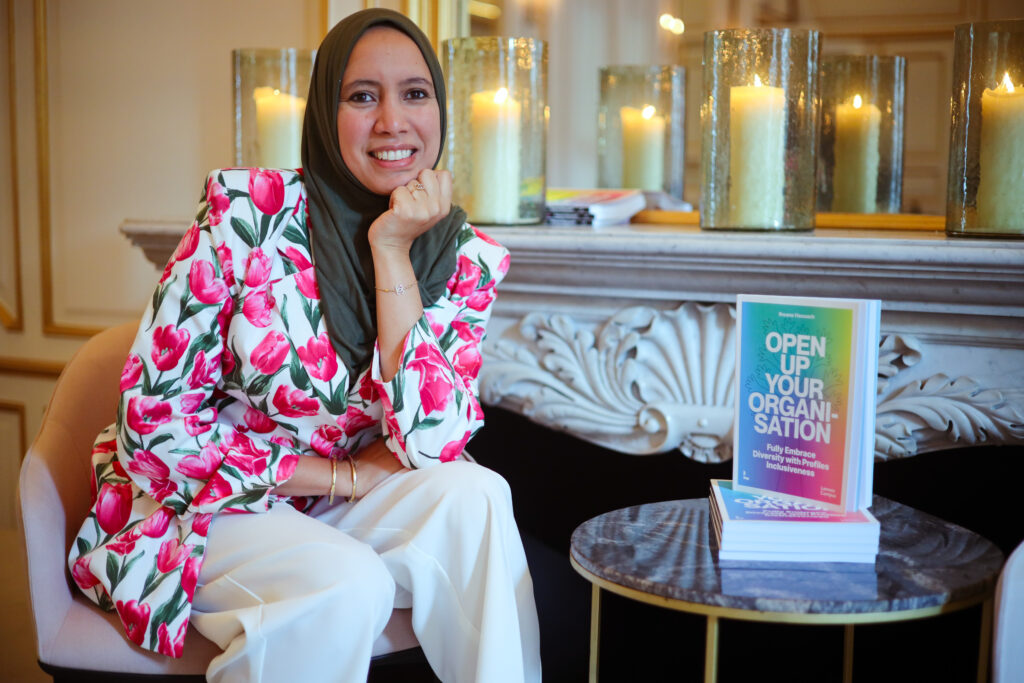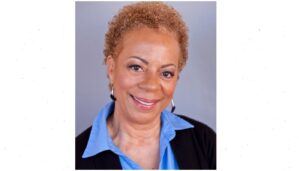Leadership in today’s world demands more than just professional excellence; it requires a deep commitment to societal values and sustainable development. Ihsane Haouach embodies this ideal as a societal entrepreneur, author, and advisor who bridges the nonprofit, public, and private sectors. Her work, particularly in the realms of energy and equity, has garnered her numerous accolades, including being named one of Belgium’s “40 under 40.”
Ihsane’s professional journey is marked by her dedication to promoting inclusive leadership and societal transformation. Her first book, “Open Up Your Organisation,” offers actionable tools to make our world more equal, focusing on diversity, equity, and inclusiveness. Her second book, “It’s Not Personal,” addresses critical societal issues such as structural sexism and cyberbullying, using a blend of reality and fiction to foster a deeper understanding of these challenges.
Beyond her professional achievements, Ihsane is also an accomplished artist, having been involved in theater and playing the piano. These creative pursuits have enriched her life and influenced her work, providing a unique perspective on the intersection of art and societal change. Today, we explore Ihsane’s vision for inclusive leadership, her journey through various sectors, and her creative endeavors that extend beyond her professional life.
- What does inclusive leadership mean to you, and how do you incorporate this philosophy into your work?
For me, a leader is someone who guides, influences, and inspires. More than ever, the world needs people who can guide gently and assertively, influence sustainably, and inspire through their experiences and values. I think that “innate” leadership is a myth, each individual can define their own leadership style, based on their profile and aspirations. Through open and fair behavior, we need to inspire acceptance of each employee, starting with acceptance of oneself by … oneself. This strengthens each individual’s sense of belonging. You don’t have to be an authority figure to do this, even if it contributes to the impact of positive influence. By virtue of exemplarity, the people around you can become a better version of themselves.
When I’m asked to intervene in a company, I first look at the organization’s culture. Corporate culture needs to be sufficiently open to allow for this other, sometimes counter-current, point of view, which is necessary for the creation of value. If an organization’s mission, governance, and operational processes are crucial in determining the degree of inclusion, it is mainly dependent on the behavior of its managers. I insist on it in my book: performance is above all a matter of human behavior. The more open and equitable attitudes are, the higher the performance will be.
- Your career spans several sectors, including energy, equity, and nonprofit initiatives. How do you balance these diverse roles, and what common thread ties them together?
For years, I did not know why I was active in energy and social equity, as well as in the private and nonprofit sectors. I’ve spent my entire career juggling different areas of expertise. Several times I thought about choosing. But I could not. Finally, it was when I was asked to give a TEDx speech that I reconciled myself. It forced me to have an introspection and formulate what my intuition was telling me.
One gets the impression that the very definition of expertise is that it must be limited to one field. But many of us have developed multiple experiences. We’re asked to choose, to prioritize, as if multiplication discredits the whole. But my interests combine perfectly when I see how difficult it is to pay energy bills and how urgent it is to take action against global warming. Then I understood that I had always been combining that expertise in decision-making in each sector.
When I think of the socio-economic vulnerability, I think of the impact on energy. When I think about the energy transition, I ask myself: how can we be socially fair? In the end, it’s all about us, people, taking care of ourselves and our planet.
- Can you tell us more about your book “Open Up Your Organisation” and the innovative model you developed for inclusive leadership?
I was tired of seeing diversity misunderstood and misused. For me, the most important thing in a company is the diversity of profiles. It starts with an open culture. If you don’t have that, don’t try to have some quotas of women, Arabs, Blacks…or disabled persons. I wanted to present a positive and challenging approach that can help companies open themselves up to all diversity, first internally, then externally. In this book, I present the OPEN way, a novel perspective based on profile inclusiveness. The concept of diversity, equity, inclusion, and inclusiveness goes beyond appearances. It encompasses everything that makes us unique among the eight billion people living on this planet. The “OPEN way” I modeled is not drastically different, yet disruptive. It’s about being Open to any viewpoint (no matter the source), Patient to really listen and interact, Empathic to put yourself in another person’s shoes, and be Natural to find the space in which each person is her or himself. O.P.E.N. stands for Openness, Patience, Empathy, Natural. To make it more concrete, I have interviewed 12 leaders (such as Ilham Kadri, CEO Solvay, and Satish Kumar, a peace activist) who shared their stories and what helped them become inclusive leaders. I use this model to inspire through keynote speeches but have also created interactive workshops.

![]()
- In your second book, “It’s Not Personal,” you address structural sexism and cyberbullying. What personal experiences or observations led you to tackle these issues?
In 2021, I have been offered a position as a government representative. This appointment was one of the most difficult times of my life. Some very vocal people didn’t like to see “a woman like me” in such a position. I was thrust to the forefront of the media-political scene and instrumentalized from all sides. I resigned after two months.
Dozens of articles appeared displaying my face, and my name, without me having wanted this attention. Thousands of tweets and other comments on social networks talked about me, without really talking about me. I was stripped of my name to become a symbol. Beyond the
political debates, I was subjected to a campaign of cyberstalking from which I needed time
to recover from. For weeks, the hashtag #ihsanehaouach was ranked among the top ten hashtags in Belgium. That’s why I wrote. I was told… “It’s not personal.”
I didn’t write my story in the stricto senso. I try to bring my vision of multiculturalism and to speak with a more audible message. Through my experience in change management and as a facilitator of a feminist corporate network, I have seen just how much the dynamics of cultural identification with a department or a company can dominate. The same patterns are reproduced in various aspects of society: sexism is unfortunately often present. The “other” is frightening, and “we” hold the truth.
Is there such a thing as truth? I don’t believe so. I know that each and every one of us holds our own truth, unique, true, neither superior nor inferior to the other.
- You serve on the board of the Brussels regulatory energy agency. What have been some of the key challenges and achievements in this role?
My principal point of attention is how to ensure a fair energy transition. A small company does not have the same challenges as a residential customer or an industry. In Brussels, we don’t have lots of space and the buildings were not constructed looking for energy efficiency. Our actual main potential for renewable energy is solar panels on buildings or house roofs and sharing it locally. It’s important that people feel close to the energy they consume and better understand the energy market. What’s wonderful is that the energy locally produced and consumed costs less. That’s a perfect example of how ecology and social equity go together. Energy is a complex market that few understand. But if we want to move the sector forward, we need all people on board. So we need to simplify, communicate, educate, improve, and remove all barriers.
- How do you manage to maintain a balance between professional excellence and personal happiness, as mentioned in your personal commitment?
I have a loving husband and three children 9, 6, and 4 years old. I’m very close to my parents and brothers & sisters, as well as to my stepfamily. It’s important to me to allocate sufficient time for them. I also need time by myself, for my piano, sports, reading, or simply watching TV. And at the same time, I am passionate about my work. I can be with my family on a Friday evening and think about a subject, go into my office and write for 40 minutes, and next Monday, I will rewrite it and publish it. It’s how creativity works, it does not tell you “Hey, an idea is coming, let’s adapt your agenda”. My family understands how I function and respect it. They know they will always be my priority but I need to engage in society. That’s who I am.
I also learned to listen to my body. Our body has a wonderful (and painful ;)) way of expressing itself. It’s generally a signal when our mind does not see straight.









